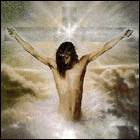|
|
|
|
|
| Buddhism | Christianity | Hinduism | Islam | Mormon | Muslim | Religions | Spirituality | My Way! | Unify | Poll/Rank |
I Have a Vision |
Heaven on Earth
|
Religions
| Da Vinci
&Scrolls |
Spirituality
| My
Way! | Deployed Loved Ones | Fair Fighting | Golden Rule | Holy Grail | Priory of Sion | Quotes | Saving Humankind | Timeouts | The 6th Sense | Why Friday 13th |
Christianity - Christian - Christians Chris·tian (kr 
christian \Chris"tian\, a. Church history: (Taken from Religious Tolerance Org)After Yeshua's (Jesus') death, his followers formed the Jewish Christian movement, centered in Jerusalem. One of Yeshua's followers, Simon Peter, may have headed the group. James, who was either Yeshua's brother, cousin, or friend, took over leadership later. They regarded themselves as a reform movement within Judaism; they continued to sacrifice at the temple, circumcise their male children, follow Jewish kosher food laws, etc. Saul of Tarsus, originally a persecutor of the Jewish Christians, reported having a vision of the risen Christ, circa 34 CE while on the road to Damascus. Adopting the new name of Paul, he became the greatest theologian of the early Christian movement. His writings, along with those of the author(s) of the Gospel of John, provided much of the theological foundation for what has been called Pauline Christianity, a movement that he spread throughout the northern and eastern Mediterranean basin. Paul's ministry was directed mainly to Gentiles -- non-Jews. Another belief system was Gnostic Christianity. They taught that Jesus was a spirit being sent by God to impart knowledge to humans so that they could escape the miseries of life on earth. They regarded the Yahweh of the Hebrew Scriptures (Old Testament) to be an inferior, short tempered, vicious creator deity who performed many genocides, and other evil acts. In addition to Gnostic, Jewish, and and Pauline Christianity, there were many other versions of Christianity being taught. Often, there would be a number of conflicting Christianities being propagated within a single city. After the destruction of Jerusalem by the Roman Army in 70 CE, the Jewish Christian movement was largely dissipated. Gnostic leaving Pauline and Gnostic Christianity as the dominant groups. Gentiles within the movement took over control of the former movement. The Roman Empire recognized Pauline Christianity as a valid religion in 313 CE. Later in that century, it became the official religion of the Empire. Church authority became concentrated among the five bishops or patriarchs located in Alexandria, Antioch, Constantinople, Jerusalem and Rome. Gnostic Christianity was severely persecuted, both by the Roman Empire and the Pauline Christian churches. It was almost exterminated, but is experiencing rapid growth today. With the expansion of Islam throughout the Middle East during the seventh century CE, power became concentrated in Constantinople and Rome. These two Christian centers gradually grew apart in belief, and practice. In 1054 CE, a split was formalized between the Roman Catholic and Eastern Orthodox churches; their leaders excommunicated each others. The split remains in effect today. Efforts are being made to heal the division. However, they are making little progress. The Protestant Reformation in the 16th century led to a split within the western church. The Protestant movement further fragmented into what is now thousands of individual denominations and groups of denominations.
| Buddhism | Christianity | Hinduism | Islam | Mormon | Muslim | Religions | Spirituality | My Way! | Unify | Poll/Rank |
I Have a Vision |
Heaven on Earth
|
Religions
| Da Vinci
&Scrolls |
Spirituality
| My
Way! | Deployed Loved Ones | Fair Fighting | Golden Rule | Holy Grail | Priory of Sion | Quotes | Saving Humankind | Timeouts | The 6th Sense | Why Friday 13th |
|
|
|